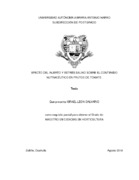Mostrar el registro sencillo del ítem
Efecto del injerto y estrés salino sobre el contenido nutracéutico en frutos de tomate.
| dc.contributor.advisor | Cabrera De La Fuente, Marcelino | |
| dc.contributor.author | León Calvarío, Israel | |
| dc.contributor.other | Sandoval Rangel, Alberto | |
| dc.contributor.other | Benavides Mendoza, Adalberto | |
| dc.contributor.other | Juárez Maldonado, Antonio | |
| dc.date.accessioned | 2018-11-05T20:14:24Z | |
| dc.date.available | 2018-11-05T20:14:24Z | |
| dc.date.issued | 2018-08-05 | |
| dc.identifier.uri | http://repositorio.uaaan.mx:8080/xmlui/handle/123456789/45486 | |
| dc.description | El injerto ayudo a mejorar los rendimientos cuando las plantas no se encontraban en condiciones salinas, así como el tamaño de frutos en plantas estresadas y no estresadas. Dentro de las variables agronómicas la salinidad disminuyo en gran medida los rendimientos, el tamaño de los frutos, la altura de planta y el diámetro del tallo. Sobre las variables bioquímicas ayudo aumentar en fruto los SST, la vitamina C y la actividad de las enzimas SOD y APx, mientras que disminuyo el contenido de licopeno. | es_MX |
| dc.description.abstract | "El tomate es una de las hortalizas que más se consume en el mundo, de tal manera que lograr un aumento en la calidad nutracéutica tendrá un efecto positivo sobre la salud de los consumidores. En esta investigación se utilizaron plantas de tomate injertadas y no injertadas sometidas a cuatro diferentes concentraciones de NaCl (0, 50, 75 y 100mM) con la finalidad de aumentar el contenido de antioxidantes presentes en los frutos, sin afectar los rendimientos. El injerto tuvo efecto sobre el contenido de licopeno y la actividad de la enzima ascorbato peroxidasa (APx), mientras que las concentraciones de 50, 75 y 100 mM aumentaron el contenido de vitamina C y la actividad de SOD y APx pero afectaron el contenido de licopeno así como los rendimientos. Los frutos en el tratamiento de injerto-100mM mostraron mayores contenidos de vitamina C y de fenoles totales. El licopeno fue mayor en los tratamientos que no se encontraban en condiciones salinas. La actividad de la enzima superóxido dismutasa (SOD) se vio mayormente beneficiada por el tratamiento sin injerto-100mM y la actividad de APx mejoro por el tratamiento sin injerto-50mM. Los rendimientos más altos se obtuvieron en tratamiento injerto-0mM" | es_MX |
| dc.format | es_MX | |
| dc.language | Español | es_MX |
| dc.publisher | Universidad Autónoma Agraria Antonio Narro | es_MX |
| dc.rights | Acceso Abierto | es_MX |
| dc.rights.uri | CC BY-NC-ND - Atribución-NoComercial-SinDerivadas | es_MX |
| dc.subject | CIENCIAS AGROPECUARIAS Y BIOTECNOLOGÍA | es_MX |
| dc.subject.other | Tomate | es_MX |
| dc.subject.other | Injerto | es_MX |
| dc.subject.other | Enfermedades | es_MX |
| dc.title | Efecto del injerto y estrés salino sobre el contenido nutracéutico en frutos de tomate. | es_MX |
| dc.type | Tesis de maestría | es_MX |
| dc.description.abstractEn | "The tomato is one of the most consumed vegetables in the world, in such a way that achieving an increase in the nutraceutical quality will have a positive effect on the health of the consumers. In this research, grafted and non-grafted tomato plants subjected to four different concentrations of NaCl (0, 50, 75 and 100mM) were used in order to increase the antioxidant content present in the fruits, without affecting the yields. The graft had an effect on the lycopene content and the activity of the enzyme ascorbate peroxidase (APx), while the concentrations of 50, 75 and 100 mM increased the vitamin C content and the activity of SOD and APx but affected the content of lycopene as well as yields. The fruits in the treatment of graft-100mM showed higher contents of vitamin C and total phenols. Lycopene was higher in treatments that were not in saline conditions. The activity of the enzyme superoxide dismutase (SOD) was mainly benefited by the treatment without graft-100mM and the activity of APx improved by the treatment without graft-50mM. The highest yields were obtained in graft-0mM treatment" | es_MX |
| dc.type.version | Versión publicada | es_MX |
| dc.audience | Estudiantes | es_MX |
| dc.audience | Investigadores | |
| dc.publisher.place | Saltillo, Coahuila, México | es_MX |
